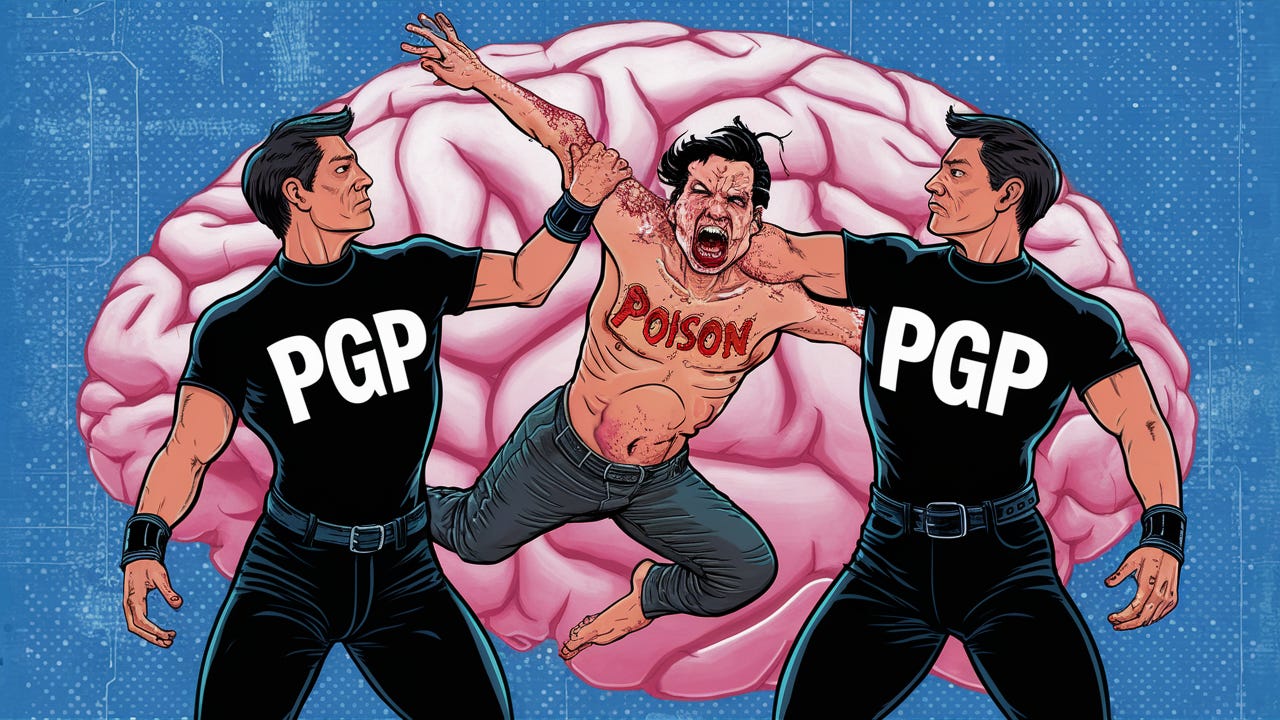WARNING! Your Detox System Is UNDER ATTACK: The War On Our Heroes of Detox: P-Glycoprotein (Pgp) and CYP3A4
These Unsung Heroes of Detox Protect Your Body, Unless Someone Tricks You Into Shutting Them Off
The body's ability to detoxify and defend itself against harmful substances is truly amazing. This article details two of the most amazing biological phenomenon related to detoxification I found while researching depopulation via mass poisoning operations. It revealed to me more than just a huge blindspot in the advice of the many quacks who never mention side effects or drug interactions, but also what appears to be a purposeful attack on our bodies’ key detox pathways for the purpose of increasing the toxicity of other poisons. In other words, drugs that shut down detox pathways are being pushed at large, and then other poisons that exploit the inhibited detox abilities are promoted that when combined complete the binary weapon.
Among the vital molecules and enzymes involved in the amazing human body detox process, two proteins stand out for their key roles: P-glycoprotein (Pgp) and Cytochrome P450 3A4 (CYP3A4). These proteins are indispensable in protecting the human body from harmful toxins and poisons. They are both endogenous which means that they are naturally produced by our bodies (so there’s no money for supplement hawks to be made here)
Our bodies continuously navigate a flood of incoming substances, many of which are toxins that could potentially disrupt or harm our systems. Pgp and CYP3A4 are crucial in protecting the body from such harmful compounds.
P-glycoprotein (Pgp): The Cellular Bouncer
P-glycoprotein, also known as multidrug resistance protein 1 (MDR1), functions like your own personal cellular bouncers - kicking out any troublemakers from your cells. Pgp is found in the cell membranes of various important tissues, including the liver, kidneys, intestines, and brain. Pgp actively pumps a wide range of substances out of cells which is absolutely vital for preventing the accumulation of toxic compounds within cells and our sanctuary organs like the brain.
One of Pgp's most crucial roles is in the blood-brain barrier, where it prevents potentially harmful chemicals from entering the brain. By doing so, Pgp protects the central nervous system from toxins and drugs that could hamper neural function or cause catastrophic damage. Additionally, Pgp plays a significant role in drug metabolism and excretion, impacting the pharmacokinetics of many drugs and toxins.
Pgp also protects other sanctuary sites in the body, such as the testes and placenta barriers, ensuring these critical areas remain free from harmful substances. Moreover, Pgp's action in the brain capillaries is a key mechanism for ridding the brain of toxins, keeping the central nervous system safe and functional.
P-Glycoprotein Substrates and Inhibitors
Pgp substrates are the substances that Pgp targets and pumps out of cells. Pgp substrates include a variety of drugs and toxins. Some notable examples include: ivermectin, mRNA vaccines (PEG is a substrate of Pgp), morphine, midazolam, remdesivir, HCQ … and there are many others. Pgp substrates are the drugs and toxins that accumulate in cells when Pgp is inhibited or genetically deficient.
Pgp inhibitors, on the other hand, are substances that block the action of Pgp. When Pgp is inhibited, its ability to pump toxins and drugs out of cells and tissues is reduced, leading to increased levels of these substances within cells, potentially leading to terrible toxicity. Some notable examples of Pgp inhibitors include quercetin, CBD, THC, curcumin, green tea, milk thistle (silymarin), mistletoe, natto K2, ivermectin, curcumin (in turmeric), resveratrol (in grapes, wine, peanuts, blueberries and cranberries), grapefruit juice, caffeine, piperine (in black pepper), capsaicin (hot peppers), remdesivir, tannic acid, gingerol (in ginger), kratom, berberine, methylene blue, glyphosate… and there are many others.
Anybody who has even remotely been paying attention the last few years should see that combinations of Pgp substrates and Pgp inhibitors have been pushed on the masses and next to nobody has warned people of the basic biology that is being exploited (I believe purposefully exploited)
CYP3A4: The Poison Disassembler
Cytochrome P450 3A4 (CYP3A4) is one of the most important enzymes in the Cytochrome P450 family, responsible for the metabolism (breaking down) of a vast array of toxins and drugs. Found predominantly in the liver and intestines, CYP3A4 metabolizes approximately 50% of all pharma drugs currently in use.
CYP3A4 transforms lipophilic compounds into more water-soluble forms, facilitating their excretion from the body. This process is crucial for the elimination of various drugs, toxins, and endogenous substrates such as hormones. CYP3A4's broad substrate specificity allows it to handle a diverse range of chemical structures, making it a key player in the detoxification process.
CYP3A4 activity can be limited by various factors, including genetic variables and interactions with other drugs called CYP3A4 inhibitors. These limitations can lead to differences in drug metabolism rates among individuals, affecting drug uptake levels and the risk of adverse effects. For instance, certain drugs, supplements and even foods can inhibit CYP3A4 activity, leading to increased plasma levels of co-administered drugs. Understanding these interactions is critical for optimizing drug therapy and avoiding potentially harmful drug-drug interactions.
CYP3A4 Substrates and Inhibitors
CYP3A4 substrates are compounds that the CYP3A4 enzyme metabolizes. A huge amount of commonly used medications and poisons are CYP3A4 substrates. By breaking down these substances, CYP3A4 works to minimize their accumulation to harmful levels in the body. CYP3A4 activity can be influenced by various factors, including genetic polymorphisms and interactions with other drugs. These variations can lead to differences in drug metabolism rates among individuals, affecting the risk of adverse effects. CYP3A4 inhibitors are substances that reduce the enzyme's activity, slowing the metabolism of its substrates. This can cause more drug uptake and for drugs to remain in the body longer, leading to increased toxicity.
Examples of CYP3A4 inhibitors include grapefruit juice, certain antibiotics, methylene blue, caffeine, gingerol (in ginger), berberine, quercetin, milk thistle, elderberry, piperine (in black pepper), capsaicin (hot peppers), kratom, Ginkgo biloba, goldenseal, grape seed & CBD… and there are many others. Understanding these interactions is critical for avoiding potentially harmful drug-drug interactions.
CYP3A4 substrates are drugs or toxins that are metabolized by CYP3A4 toxins are part of the detox process. Notable CYP3A4 substrates that are heavily pushed include: ivermectin, morphine, midazolam, remdesivir, HCQ, … and many others. Something like 50% of pharma drugs are CYP3A4 substrates.
Implications For Pharmaceuticals & Supplements
There are many potent over the counter Pgp inhibitors being pushed recklessly (I believe with bad intent). Likewise there are many toxic Pgp substrates that are being promoted in tandem. The combination of these can result in disaster.
Similarly, numerous potent over-the-counter CYP3A4 inhibitors are being marketed irresponsibly. In addition, many hazardous CYP3A4 substrates are being promoted alongside them. This combination can lead to disastrous consequences.
Nobody is being warned about the pharmacokinetics and the possibilities of severe drug interactions due to the inhibition of Pgp and CYP3A4.
Always check the effects of what you are taking. I’ve seen so much foul play at this point that I don’t trust anything these poison pushers say anymore. I started actually researching all these weird supplements they are pushing and it screams that people are being deceived- tricked into consuming what amounts to terrible poison. They never show their work and they make the most vague ridiculous claims that upon closer inspection are clearly just invocations of dark psychology.
My heart goes out to anyone who has fallen pray to the cacophony of awful medical advice on the internet and traditional media.
I will debate anybody on the importance of Pgp and CYP3A4 and the harms of ivermectin - let’s set something up
In future articles I will share more studies showing the increased accumulation of the substrates of Pgp and CYP3A4 when these detox pathways are inhibited, but to keep this article short and digestible, I will just refer you to prior articles I’ve written about Pgp and CYP3A4 with a focus on ivermectin which I have identified as a key tool for depopulation around the world:
P-glycoprotein Deficiency (Genetic Or Drug Induced) & Increased Ivermectin Toxicity
Pig Study Raises MAJOR Questions Of Dangers Of Combining Quercetin & Ivermectin




No comments:
Post a Comment